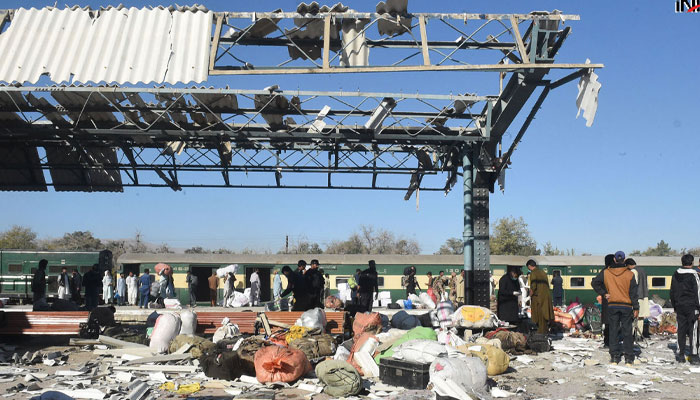Terror and tragedy
Baloch Liberation Army (BLA) claims responsibility, adding this attack to province’s unending tally of violence
Balochistan endured yet another tragedy as a suicide blast at Quetta’s railway station yesterday (Saturday) claimed the lives of at least 27 people, including members of law enforcement, while leaving dozens more injured. The Baloch Liberation Army (BLA) claimed responsibility, adding this attack to the province’s unending tally of violence. This follows last month’s deadly assault on miners in Duki, where at least 20 labourers were killed in a brutal rocket attack. These incidents are not isolated; they are symptomatic of a deeply embedded crisis in Balochistan, one that demands more than the customary cycle of condemnation and calls for ‘iron-fist’ tactics. While Baloch grievances may be real, the BLA’s violent actions are not the answer; in fact, they only make matters worse. Brutal attacks like the one in Quetta are indefensible and can never be justified. Targeting civilians and law enforcement personnel alike, these acts of terror do nothing but deepen the suffering of the Baloch people, adding bloodshed to an already strained society. Such violence undermines the legitimate aspirations of those Baloch who seek justice, equality, and a voice through peaceful means. The BLA’s actions are not a form of resistance but a tragic diversion from the path to peace, damaging any chance for constructive dialogue and only serving to strengthen the very forces that perpetuate this cycle of violence and mistrust.
Prime Minister Shehbaz Sharif and other political figures have swiftly denounced this latest act of terror, but words alone are insufficient. Each time tragedy strikes Balochistan, we witness statements of resolve from leaders across the board, only for violence to return within weeks. This cycle of rhetoric without results highlights the absence of a cohesive and comprehensive anti-terrorism strategy in Pakistan. While our security forces have been resolutely battling these threats, sacrificing lives and conducting extensive operations, a broader approach is imperative. Terrorism cannot be defeated by military might alone; it requires a synchronised effort, uniting political will with strategic foresight. What Balochistan needs is not only a counterterrorism policy but also a solution that acknowledges the political grievances that have been festering for decades. There exists a severe trust deficit between the state and the people of Balochistan, an alienation exacerbated by unresolved issues such as the missing persons crisis. This approach only pushes more people towards resentment and, at times, fuels extremist ideologies.
We must recall that during the PPP’s tenure in 2009, the Aghaz-e-Haqooq-e-Balochistan package and the 18th Amendment were passed with consensus, ushering in long-demanded provincial autonomy. This initiative, though imperfect, was a step towards addressing some of the grievances that have long stoked feelings of exclusion in Balochistan. Today, the PPP’s presence in Balochistan’s government positions it uniquely to rekindle dialogue with Baloch nationalist leaders. Engaging with Baloch stakeholders through an open and inclusive political dialogue is key to fostering an atmosphere of trust, addressing grievances, and welcoming disaffected voices back into the fold. To demand fair treatment and accountability is not an act of treason but a democratic right, one that should be respected, not repressed. A military response may be necessary to counter terrorism, but it will never be sufficient to resolve the broader issue of alienation in Balochistan. Only a political approach, based on dialogue and addressing legitimate grievances, can heal the wounds of the Baloch people. But on the other end of the spectrum also lies a glaring truth: the BLA’s acts of terror just cannot go on as is and need to be tackled head-on. It is possible to manage both ends at the same time.
-
 Leonardo DiCaprio's Girlfriend Vittoria Ceretti Given 'greatest Honor Of Her Life'
Leonardo DiCaprio's Girlfriend Vittoria Ceretti Given 'greatest Honor Of Her Life' -
 Beatrice, Eugenie’s Reaction Comes Out After Epstein Files Expose Their Personal Lives Even More
Beatrice, Eugenie’s Reaction Comes Out After Epstein Files Expose Their Personal Lives Even More -
 Will Smith Couldn't Make This Dog Part Of His Family: Here's Why
Will Smith Couldn't Make This Dog Part Of His Family: Here's Why -
 Kylie Jenner In Full Nesting Mode With Timothee Chalamet: ‘Pregnancy No Surprise Now’
Kylie Jenner In Full Nesting Mode With Timothee Chalamet: ‘Pregnancy No Surprise Now’ -
 Laura Dern Reflects On Being Rejected Due To Something She Can't Help
Laura Dern Reflects On Being Rejected Due To Something She Can't Help -
 HBO Axed Naomi Watts's 'Game Of Thrones' Sequel For This Reason
HBO Axed Naomi Watts's 'Game Of Thrones' Sequel For This Reason -
 King Charles' Sandringham Estate Gets 'public Safety Message' After Andrew Move
King Charles' Sandringham Estate Gets 'public Safety Message' After Andrew Move -
 Lewis Capaldi Sends Taylor Swift Sweet Message After 'Opalite' Video Role
Lewis Capaldi Sends Taylor Swift Sweet Message After 'Opalite' Video Role -
 Brooklyn Beckham Plunges Victoria, David Beckham Into Marital Woes: ‘They’re Exhausted As It Seeps Into Marriage
Brooklyn Beckham Plunges Victoria, David Beckham Into Marital Woes: ‘They’re Exhausted As It Seeps Into Marriage -
 Sarah Ferguson Joins Andrew In ‘forcing’ Their Daughters Hand: ‘She Can Lose Everything’
Sarah Ferguson Joins Andrew In ‘forcing’ Their Daughters Hand: ‘She Can Lose Everything’ -
 'Bridgerton' Author Reveals If Actors Will Be Recast In Future Seasons
'Bridgerton' Author Reveals If Actors Will Be Recast In Future Seasons -
 50 Cent Super Bowl Ad Goes Viral
50 Cent Super Bowl Ad Goes Viral -
 'The Housemaid' Lifts Company's Profits: Here's How
'The Housemaid' Lifts Company's Profits: Here's How -
 Michael Douglas Recalls Director's Harsh Words Over 'Wall Street' Performance
Michael Douglas Recalls Director's Harsh Words Over 'Wall Street' Performance -
 Henry Czerny On Steve Martin Created Humor On 'Pink Panther' Set
Henry Czerny On Steve Martin Created Humor On 'Pink Panther' Set -
 Lady Victoria Hervey: Andrew Mountbatten-Windsor's Ex-girlfriend Proud Of Being On Epstein Files
Lady Victoria Hervey: Andrew Mountbatten-Windsor's Ex-girlfriend Proud Of Being On Epstein Files




